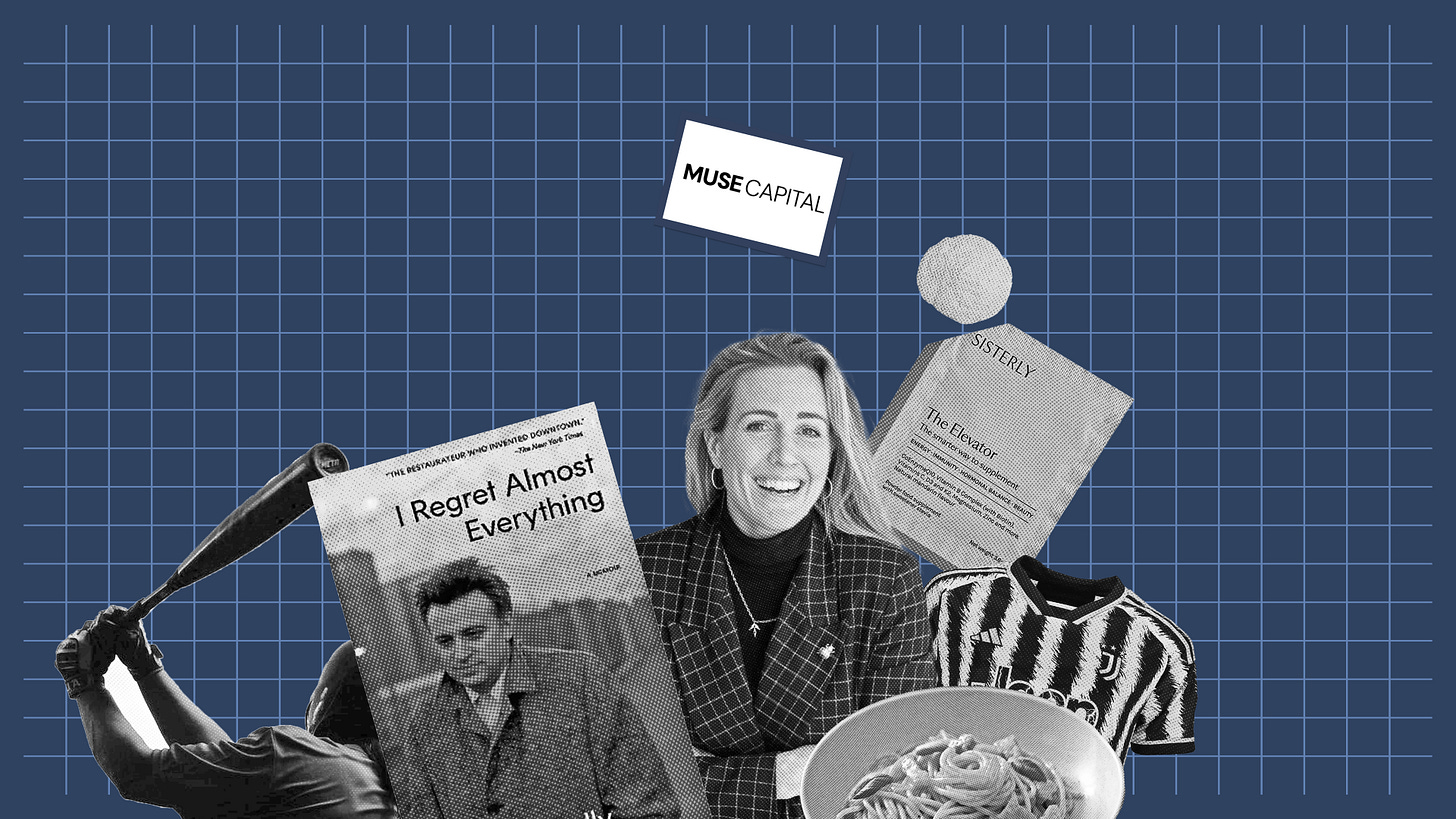Assia Grazioli-Venier - Muse Capital
“Women’s bodies, needs, and spending power have long been undervalued. That’s finally changing - and we’re at the center of that shift.”
Connect with Assia
VC Uncovered's View
The future of venture belongs to agile, audacious investors who are unafraid to challenge the established norms and uncover transformative (often overlooked) opportunities. Muse Capital, under Assia and her partner Rachel’s guidance, perfectly exemplifies this philosophy, particularly through its pioneering focus on consumer technology sectors that are redefining how we "CARE (women's health, childcare & elderly care), PLAY (gaming, metaverse), and LIVE (wellness and sustainability)."
Muse Capital leverages its two decades of global operating experience and extensive network to operate with the swiftness of a specialized, targeted fund. This enables them to identify and champion groundbreaking founders who are shaping the future consumer experience, especially within markets that larger players have historically ignored or deemed "niche"—most notably, those centered around women's needs and empowerment.
Muse Capital's unwavering commitment to conscious capitalism and its impressive 70% diverse-founded portfolio underscore a profound understanding that inclusive teams and varied perspectives are not merely beneficial but essential drivers of competitive advantage and superior outcomes. The firm does more than just provide capital; they actively collaborate with founders, offering invaluable hands-on support in market entry, commercialization, and scaling.
This unique foresight and passion for the space allows Muse Capital to lead the charge in funding the crucial infrastructure and experiences missing for women, from health to sports, driven by a deep conviction in the value and potential of these burgeoning markets.Meet Assia
Q: You can be anywhere. Eating, drinking, and reading your favorite thing. What is it?
A: Spending time with my 6-month-old son. Nothing more grounding and nothing more extraordinary than the responsibility of guiding and loving a little human on how to engage with the world. While he's still on a milk diet, mine consists of pasta 99% of the time. I am drinking a sachet of Sisterly vitamins that I now can't live without, and currently reading “I Regret Almost Everything” by Keith McNally.
Key Quotes
"Founders who’ve been told 'no' too many times should probably just hear it as 'on' and go change the world."
"We’re not here for the glossy pitch. We’re here for the real story - and the real work."
"Success at Muse happens when a founder calls us with the hard stuff, not just the wins."
"Women’s bodies, needs, and spending power have long been undervalued. That’s finally changing - and we’re at the center of that shift.”
“The goal isn’t just to be successful. It’s to be valuable. Once you’re valuable, success comes to you.”
Original Responses (Lightly Edited for Clarity and Flow)
Background and Personal Journey
Experiences Shaping My Investment Approach
My investing lens is shaped by what I call my "gathering years." I've worked across music, tech, sports, and media—each chapter teaching me a different side of culture, commerce, and value creation.
In my early 20s, I ran a digital content platform at Ministry of Sound in London. It was the Wild West of digital music, and I learned how to create momentum with no playbook. Then came Spotify. I had a front-row seat watching Daniel Ek build one of the most iconic companies of our time. I learned velocity, vision, and the power of conviction.
In 2012, I joined the board of directors at Juventus. I was the youngest and first woman in the history of a storied men's sports team. I learned how to operate within seasonal businesses, protect IP across multiple revenue streams, and navigate legacy industries while building something new—brand extensions from J Health to J Village to Juventus Women, which we launched in 2016.
Later, my advisory role at Northzone taught me the bones of venture. I realized that this commercial operator without a Stanford MBA might actually have an edge, not just in identifying early winners, but in accelerating them. I learned to ask smart questions. I learned to trust my instincts. And I learned that if the hair on your arms stands up, pay attention. I also learned that the hands-on support I provided to founders was unique and valuable.
I've lived in London, Milan, Stockholm, New York, and Los Angeles. Across cultures and industries, one thing remains constant: people are everything. I'm proudly dyslexic. It's been both a creative superpower and a constant reminder to build teams that complement your blind spots. That instinct ultimately led me to my co-founder, Rachel Springate—one of the greatest encounters of my career.
Moment Inspiring Venture Capital Career
Venture found me gradually, and then all at once. It didn't feel like an obvious fit.
I didn't come from banking.
I didn't go to business school.
I wasn't handed a seat at the table—I carved one out my own.
My first exposure came when I joined the board of advisors at Northzone. I was skeptical at first. Could I really make a dent in this world? But I saw how the work I did—connecting founders to the right partners, crafting early distribution strategy—moved the needle. I didn't just belong; I was already doing the job.
Then came a twist when I met my co-founder, Rachel, on the opposite side of a deal while at Spotify. Rachel pitched me a company for acquisition, and while spending a year negotiating against each other, we formed a bond that ran deeper than business. We've been by each other's sides ever since, and in our friendship, we found something more: a shared frustration with a healthcare system that repeatedly failed women like us. From my car accident in my early 20s, to breast cancer at 35 and fertility struggles, to our joint realization that we didn't even understand our own hormones... we knew something had to change.
We kept asking: how can there be so many solutions for everything except women's health? That's when we pulled back the curtain:
In 1993, women were still excluded from most clinical trials.
Only 2% of healthcare R&D funding goes to female-specific conditions.
And less than 2% of venture funding goes to female-only founding teams.
Muse Capital was born out of this revelation. We weren't just going to write checks. We were going to build a new playbook—investing in companies that should exist and using our backgrounds to influence outcomes. Muse wasn't about getting into venture for the sake of it. It was about changing who gets funded and who gets to lead. It's high time that the face of venture reflects the broader range of perspectives within real markets, and we're excited to be working towards that with every check, deal, and partnership we forge at Muse.
Influences on Worldview
I still draw on the framework from my time at Barnard and my degree in Environmental Biology: diverse ecosystems are the stable state. They rebound faster from disruption. They resist pathogens more effectively. They are, quite simply, more resilient. That concept guides everything at Muse—how we build our team, how we construct our portfolio, and how we evaluate founders. Pattern-matching works in some areas and stifles others. I want resilience, differing views, and diverse teams. I want the people who've lived the problem and have the creativity to solve it. McKinsey data shows diverse teams are 36% more likely to outperform on profitability. That's not charity; that's strategy.
We're often the first check into many of these startups, and we've helped companies like Midi Health, CoFertility, and Ohai.ai go from early ideas to national partnerships, top-tier press, and follow-on funding.
Philosophy and Insights
Investment Philosophy
We invest in companies that should exist, especially in sectors where the world is underserved and the opportunity is wildly underestimated.
At Muse Capital, we focus on how we care, live, and play - with 70%+ of our portfolio led by diverse founders. We’ve built our thesis around the idea that the most transformative companies often start where traditional venture doesn’t look. Not because the market isn’t there, but because the decision-makers don’t reflect it.
Approach to Risk
At Muse Capital, we approach risk through the lens of value creation. We don't see it as something to avoid, but as something to actively shape. Our strategy is built on identifying overlooked markets and founders that others often underestimate, including women's health, the parenting economy, and more. These categories may appear riskier to traditional investors, but to us, they represent clear white space backed by population trends, shifting consumer behaviors, and unmet demand.
Measuring Success Beyond Returns
Financial returns matter. But we also ask ourselves: what did we make possible?
Did we help a founder close their first institutional round?
Did we get them distribution, a celebrity partner, a Fortune 100 pilot?
Did we shift the narrative on an issue like menopause, mental health, or hormone tracking?
That’s what success looks like at Muse: when a founder calls us with the hard stuff, not just the wins. When an LP tells us they’re proud of what their money made possible. When an entire market wakes up to something we were early on. We’ve seen Eli Health go from an under-the-radar hormone startup to CES HealthTech of the Year. We’ve seen CoFertility achieve significant milestones.
Trends and Future Vision
Misconceptions about VC
I think there’s the narrative of the brilliant lone wolf investor who sees around corners, driving innovation. My experience of venture is that it’s much more of a team sport. Venture has to be.
Emerging Trends and the Future of “Play”
In the "play" sector, we’re witnessing an explosion of interest in women’s sports, emerging leagues, and inclusive entertainment. We launched Juventus Women in 2016 and then invested in the Washington Spirit in 2020, when few were paying attention. Today, women’s sports are commanding sellout crowds and record-breaking viewership. We didn’t just watch this shift—we helped build it.
Through Muse Sport, we’ve backed the Spirit, SailGP (a coed racing league at the forefront of innovation), and most recently launched the WPBL, the Women’s Professional Baseball League, where I now serve as Chair of the Board.
The flywheel between women’s sports and women’s health is real—cycle-based training, injury prevention, and hormonal performance optimization. These links matter to both the professional athlete and the amateur runner.
The Perfect Founder Pitch
I want to hear the three T's: Team, TAM (total addressable market), and Timing. And I'll add a fourth: Tenacity. Start with the problem. Tell me why it matters now. Show me why you're the person to solve it.
Great founders show urgency and clarity, but also vulnerability. What keeps you up at night? What don't you know yet? I'll back the founder who says, "Here's the gap, and here's how I'm going to close it," and here is why now, over someone selling perfection any day. Particularly when looking at women's health or health tech companies, it's also crucial to have an understanding of the system itself, from insurance companies to healthcare networks. Not only does this demonstrate diligence, but it further legitimizes the idea that a founder can provide a clear view of how their solution fits into and/or disrupts the existing ecosystem.









